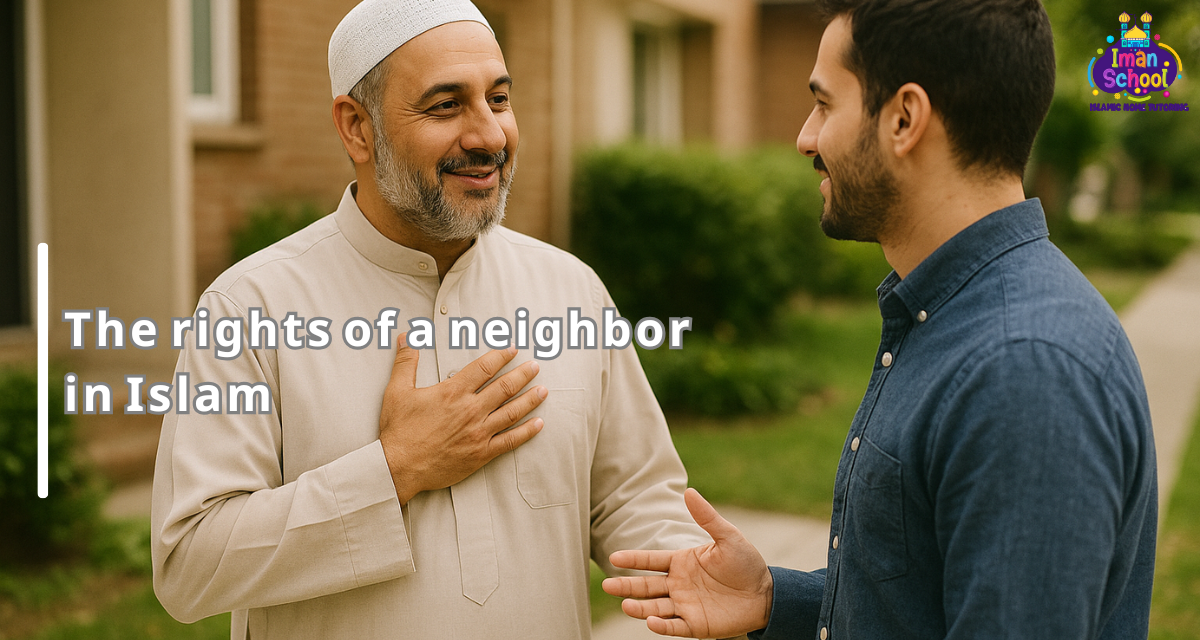In a world that often prioritizes individualism, Islam places immense value on community and the bonds that tie people together. At the heart of this social fabric lies a deeply emphasized concept: the rights of a neighbor in Islam. This isn't just about being friendly; it's a fundamental aspect of a Muslim's faith and character, with clear guidelines laid out in the Quran and the Sunnah of the Prophet Muhammad (peace be upon him).
Who is a Neighbor in Islam? An Easy Definition
So, who exactly is a neighbor? The definition is broad, encompassing more than just the person living next door. According to Islamic scholars, a neighbor can be anyone living within a 40-house radius in every direction—front, back, left, and right. This expansive view of rights of neighbors in Islam highlights the importance of fostering a wide network of community. This is a core part of social relations in Islam, and it’s a concept that builds a strong, interconnected community.

Read More: Human Rights in Islam
The Quran and Sunnah on Treating Neighbors
Both the Quran and the Sunnah of the Prophet Muhammad (peace be upon him) stress the profound importance of a neighbor's rights.
The Quran
Allah says in the Holy Quran:
"Worship Allah and associate nothing with Him, and to parents show kindness, and to relatives, orphans, the needy, the near neighbor, the distant neighbor, the companion at your side, the traveler, and those whom your right hands possess. Indeed, Allah does not like those who are proud and boastful." (Surah An-Nisa, 4:36)
This verse places kindness to neighbors directly after kindness to parents and relatives, a clear indication of its high status in Islam. It teaches us the importance of the neighbor in the Quran.
The Sunnah
The Prophet Muhammad (peace be upon him) spoke extensively about the importance of being a good neighbor. A famous Hadith about neighbors narrated by Aisha (may Allah be pleased with her) states that the Prophet (peace be upon him) said:
"Jibril kept recommending me to treat my neighbors well until I thought he would make them my heirs." (Bukhari, 6014; Muslim, 2624)
This profound statement shows just how serious the Quran and Sunnah on neighbors are. It's a key part of Islamic etiquette with neighbors and is a cornerstone of Islam and community building.
10 Key Rights of a Neighbor in Islam
Here are ten key rights of a neighbor in Islam that every Muslim should know and practice:
-
To be a source of safety and security for them.
-
To greet them with peace and kindness.
-
To visit them when they are sick.
-
To console them in times of grief and tragedy.
-
To congratulate them on their good fortune.
-
To share food with them, especially if you cook something aromatic.
-
To not build your house so high as to block their view or light without their permission.
-
To cover their private areas with yours.
-
To offer them a helping hand when they need it.
-
To be patient with their shortcomings and avoid spying on them.
Learn More: Dialogue methods in Islam
Practical Ways to Be a Good Muslim Neighbor
In today's world, especially for Muslims living in the West, practicing how to be a good neighbor in Islam is a powerful form of da'wah (calling to Islam). Here are 10 practical tips to show the beauty of the rights of a neighbor in Islam:
-
Introduce Yourself: A simple introduction can go a long way.
-
Share a Meal: Share a dish with them on a special occasion, or just as a random act of kindness.
-
Offer Help: Assist them with simple tasks like carrying groceries or shoveling snow.
-
Be Quiet: Keep noise levels down, especially late at night.
-
Look Out for Their Property: Keep an eye on their home when they are away.
-
Offer a Ride: If you see them waiting for a bus or walking in the rain, offer them a ride.
-
Participate in Community Events: Show up to block parties and local events to build a connection.
-
Exchange Gifts: Small gifts, like sweets or flowers, can build a bond.
-
Ask About Their Well-Being: Show genuine concern for their health and family.
-
Keep the Area Clean: Maintain a clean and tidy yard and a clean environment.
These actions are not just Islamic manners and etiquette; they are a direct representation of Islamic values.

Find Out More: Manners Every Muslim Should Know
Dealing with a Difficult Neighbor: An Islamic Perspective
Even the most difficult situations have a clear path in Islam. How to deal with a bad neighbor in Islam is a test of a person's character. The Prophet Muhammad (peace be upon him) taught us to be patient and forgiving.
If a neighbor causes harm, one should first try to address the issue with kindness and patience. If that fails, one may seek help from others in the community to mediate. Ultimately, a Muslim should never return harm for harm, but rather, deal with the situation with wisdom and piety. This is a crucial element of the rules of neighbors in Islam.
The Story of the Prophet Muhammad and His Neighbor
The life of the Prophet Muhammad (peace be upon him) is the greatest example of how to treat a neighbor. A well-known story about prophet Muhammad's neighbors highlights this perfectly.
It is narrated that the Prophet (peace be upon him) had a Jewish neighbor who used to throw trash in front of his house. The Prophet (peace be upon him) never reacted with anger or retaliation. Instead, when he noticed that the man had stopped throwing trash for a few days, he went to visit him, only to find out that the man was sick. The neighbor was so moved by the Prophet's compassion that he embraced Islam.
This story, though often cited, is a powerful lesson in Hadith about kindness to neighbors and the importance of Islamic manners and etiquette.
Why a Neighbor's Rights Are So Important in Islam
The importance of neighbors in Islam can be seen through these 10 points:
-
A Sign of Faith: Being a good neighbor is a sign of true faith. The Prophet (peace be upon him) said, "He does not believe in me who eats his fill while his neighbor is hungry."
-
A Source of Peace: Good neighbors create a peaceful and safe environment for everyone.
-
A Form of Charity: Looking after a neighbor is an act of charity, which is highly rewarded.
-
A Way of Spreading Da'wah: Your good behavior can be a powerful way of calling others to Islam, as seen in the story of the Prophet's neighbor.
-
A Reflection of Your Character: How you treat your neighbor is a reflection of your own moral character and ethics in Islam.
-
A Social Obligation: It is a social duty that strengthens the entire community.
-
A Fulfillment of Allah's Command: It is a direct command from Allah in the Quran.
-
A Sunnah of the Prophet: Following the prophet Muhammad's neighbors behavior is a cherished part of the Sunnah.
-
A Practical Expression of Islam: It turns abstract beliefs into real-world actions.
-
A Shield against Evil: A strong community of good neighbors acts as a shield against many social ills.
This is the essence of Islam and community, a concept that is vital for being a Muslim in the West.
Continue Reading: Family in Islam
The Fiqh of Neighborly Relations: Common Questions Answered
Understanding the Fiqh of neighborly relations helps us apply these principles in a practical way.
Do I have to be a good neighbor to non-Muslims?
Yes. The Hadith about kindness to neighbors and the Quranic verse are general and apply to all neighbors, regardless of their religion.
What is the highest rank of neighbor?
Scholars have divided neighbors into three ranks:
-
A neighbor who is also a relative and a Muslim (who has three rights).
-
A neighbor who is a Muslim but not a relative (who has two rights).
-
A neighbor who is a non-Muslim (who has one right). However, all neighbors have a fundamental right to be treated with kindness.
Is it a sin to have a bad relationship with a neighbor?
Yes, it can be. The Prophet (peace be upon him) warned against this, as it violates a fundamental Islamic principle.
What if a neighbor is harassing me?
You should first try to address the issue gently, then seek help from community leaders. If the harassment continues and poses a threat, you may involve the authorities, but only after exhausting other avenues.
Is it okay to borrow from a neighbor?
Yes, borrowing and helping each other is part of the Islamic social studies and is encouraged.
Explore Now: Fundamentals of Islamic Jurisprudence
Teaching Your Children About the Rights of a Neighbor
Instilling these values in our children from a young age is crucial. Parents can teach their children the rights of a neighbor in Islam by:
-
Leading by example.
-
Sharing stories about the Prophet and his companions.
-
Making sharing food or helping a neighbor a family activity.
-
Enrolling them in a structured program that teaches Islamic social studies and ethics in Islam.
Iman School is a leading online Islamic school that offers comprehensive courses on Fiqh and social studies. Our curriculum focuses on Islamic manners and etiquette and provides clear lessons on the rights of a neighbor in Islam.
We provide Islamic social studies and a structured learning environment to help children understand the importance of building a strong community and fulfilling their duties as Muslims.




